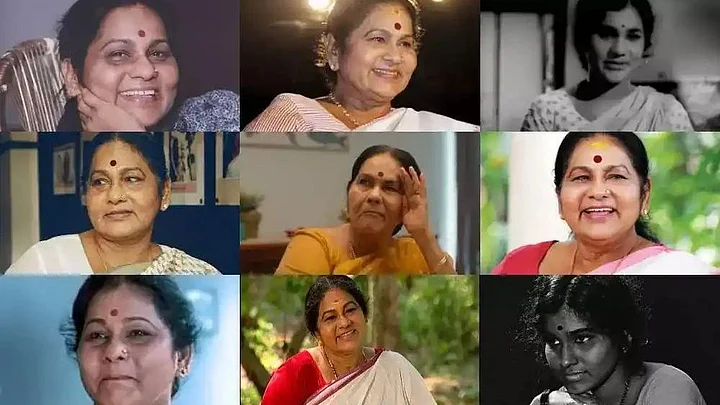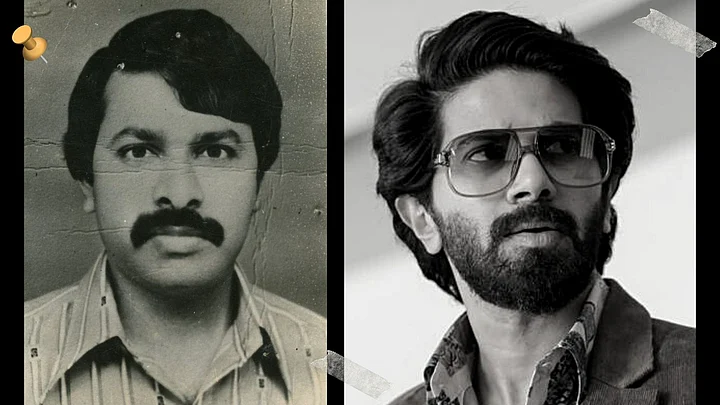When KPAC Lalitha released her partial autobiography titled Kadha Thudarum (The Story Continues) in 2010 it created quite a furore, for it touched upon many sensitive topics giving credence to events which were in the realm of speculation until then. And although Lalitha promised to add to her memoirs in the future, that never happened as she remained busy in films and ventured into daily television soaps in the following decade. The veteran actress breathed her last after prolonged illness on 22 February.

KPAC Lalitha's partial autobiography Kadha Thudarum.
(Photo Courtesy: Anand Kochukudy)
KPAC Lalitha was that rare actor who straddled the world of theatre, films and TV soap operas with equal ease, and remained active throughout her career spanning six decades. Born in 1947 as the eldest child to her parents, Lalitha had to navigate a tough Dickensian childhood after her Communist-leaning photographer father went underground when the undivided Communist Party decided to wage an armed struggle in the wake of the Calcutta Thesis. Her early childhood was spent in Thodupuzha, Kayamkulam and Changanassery, before she took to dance and by extension, theatre.
It was her induction into KPAC, or the Kerala People’s Arts Club, the left-leaning mass theatre movement that changed her life in many ways, as it opened many doors to eventually making her mark in tinsel town. Lalitha never hesitated to admit how KPAC defined her life and career, and continued to carry the prefix as a badge of honour throughout her long career. In fact Lalitha had joined KPAC shortly prior to the split in the Communist Party in 1964, which led to the likes of KP Ummer, KS George and Sulochana quitting the group altogether in its wake.

Bharat Gopy and KPAC Lalitha in Kodiyettam (1977).
(Photo Courtesy: Facebook)
The Bhasis: Thoppil and Adoor Bhasi
Lalitha continued to stick with KPAC which saw a dip in fortunes following the split, while also remaining an active political worker with the Communist Party of India. But as her mentor at KPAC and legendary playwright Thoppil Bhasi shortly made his mark in Malayalam cinema, it also paved the way for Lalitha to the film industry in 1969 and she would never look back, quitting KPAC in the early 1970s to move to Madras. After the initial couple of movies based on film adaptations of Thoppil Bhasi’s dramas, Lalitha made a mark with films such as Vazhvemayam, Anubhavangal Palichakal, Maram and Thriveni, eventually becoming a busy character artiste and supporting actress.
If Thoppil Bhasi was to remain her mentor throughout, Lalitha portrays actor Adoor Bhasi as the villain in her life in her autobiography, recounting how the celebrated actor made unwanted advances and victimized her in the wake of her spurning it, refusing to be paired with her and getting her thrown out from films. Lalitha even wrote how she unsuccessfully made a written submission to KP Ummer, then president of the Chalachithra Parishad, predecessor of Association of Malayalam Movie Artists (AMMA).
A Bundle of Contradictions
And yet, when the horrific abduction and sexual assault of a prominent actress rocked Mollywood in 2017, Lalitha was quick to spring to the defense of accused actor Dileep – for someone who went through a harrowing experience herself, failing to lend solidarity to the fellow-actress.
In that way Lalitha, the individual, was always a bunch of contradictions: she was a die-hard Communist, self-admittedly slavish as she would reaffirm in an interview in Manorama News, but an equally staunch Guruvayoorappan (Lord Krishna) devotee. Lalitha would defend her faith by invoking the likes of KR Gowri, and would take a swipe at fellow Communists who kept their devotion a secret.
KPAC Lalitha’s Oeuvre
For someone who started out young in movies, Lalitha constantly evolved to remain relevant throughout her career, hitting a high in the late-1980s and ‘90s, coinciding with the golden era of Malayalam films. Lalitha also made herself indispensable in character roles, forming a hit pair with actor Innocent, moving on from the likes of Adoor Bhasi, Bahadoor and Alummoodan.
Lending her voice to Vaikom Muhammed Basheer’s Narayani in Mathilukal (1990), adapted to screen by Adoor Gopalakrishnan, was a high point in her career, leaving a mark with just her voice. Her pairing with Mammootty albeit in a comical track in Kanalkattu (1991) was equally endearing, even as she teamed up with the talented Urvashi in many successful commercial ventures in the early-nineties.

KPAC Lalitha with Mammootty.
(Photo Courtesy: Facebook)
Adoor Gopalakrishnan would repeat her in Kadhapurushan (1996) and for his screen adaptations of Thakazhi Sivasankara Pillai’s stories in Naalu Pennungal (2007) and Oru Pennum Randanum (2008) where she spoke in the native Kuttanad slang which stood out for its authenticity. Lalitha was a quintessential component of Sathyan Anthikkad films and also figured in major films of director-husband Bharathan.
Lalitha’s turn in Amaram (1991) was particularly noteworthy, playing the earthy character with a rare flourish, following it up with Venkalam (1992) which was equally appreciated. Never short of bucketfuls of tears, Lalitha often recounted how she would channelize her tough experiences in life to deliver powerhouse performances.
Forever the Bridesmaid Never the Bride
KPAC Lalitha won the National Award for the Best Supporting Actress in 1990 and 2000 apart from winning the Kerala State Best Second Actress award four times (1975, 1978, 1990, 1991). Lalitha’s marriage with Bharathan in 1979 materialized after a lot of drama, shortly after her turn in the latter’s Rathinirvedam (1979) where she played a significant role paired with MG Soman.
As with her reel life, Lalitha had to often remain content playing the second lead in real life, with Bharathan’s fling with first love Srividya getting rekindled on the sets of Kattathe Kilikkoodu (1983), but Lalitha chose to forgive and forget, having been aware of their relationship back in the day. In fact, when scenarist John Paul first wrote about the nature of Srividya’s relationship with Bharathan after his passing, he had to cop a lot of criticism but Lalitha herself endorsed the claim later.

KPAC Lalitha with husband filmmaker Bharathan.
(Photo Courtesy: Facebook)
Her married life was eventful, with Lalitha often struggling to check the bohemian lifestyle of her husband, whose alcoholism and waywardness left her forever in debt despite the ace director’s significant filmography until his untimely death in 1998.
Politics Beckoning
In 2016, the Communist Party of India (Marxist) came calling, offering the Wadakkanchery ticket in the forthcoming assembly elections; having politely turned it down, Lalitha endorsed the Left Democratic Front (LDF) and actively campaigned for the Marxist party in the election. The LDF rewarded her by nominating her as chairperson of the Kerala Sangeetha Nataka Academy. Lalitha continued to act till she took ill and remained an indispensable part of Malayalam cinema throughout.
As someone remarked on her passing, Lalitha’s void can perhaps never be filled by someone else and her versatile characters will remain etched in the memory of Kerala’s film lovers.
(Anand Kochukudy is a Kerala-based journalist and former editor of The Kochi Post. He tweets @AnandKochukudy. This is an opinion article and the views expressed are the authors' own. The Quint neither endorses nor is responsible for them.)
(At The Quint, we question everything. Play an active role in shaping our journalism by becoming a member today.)


